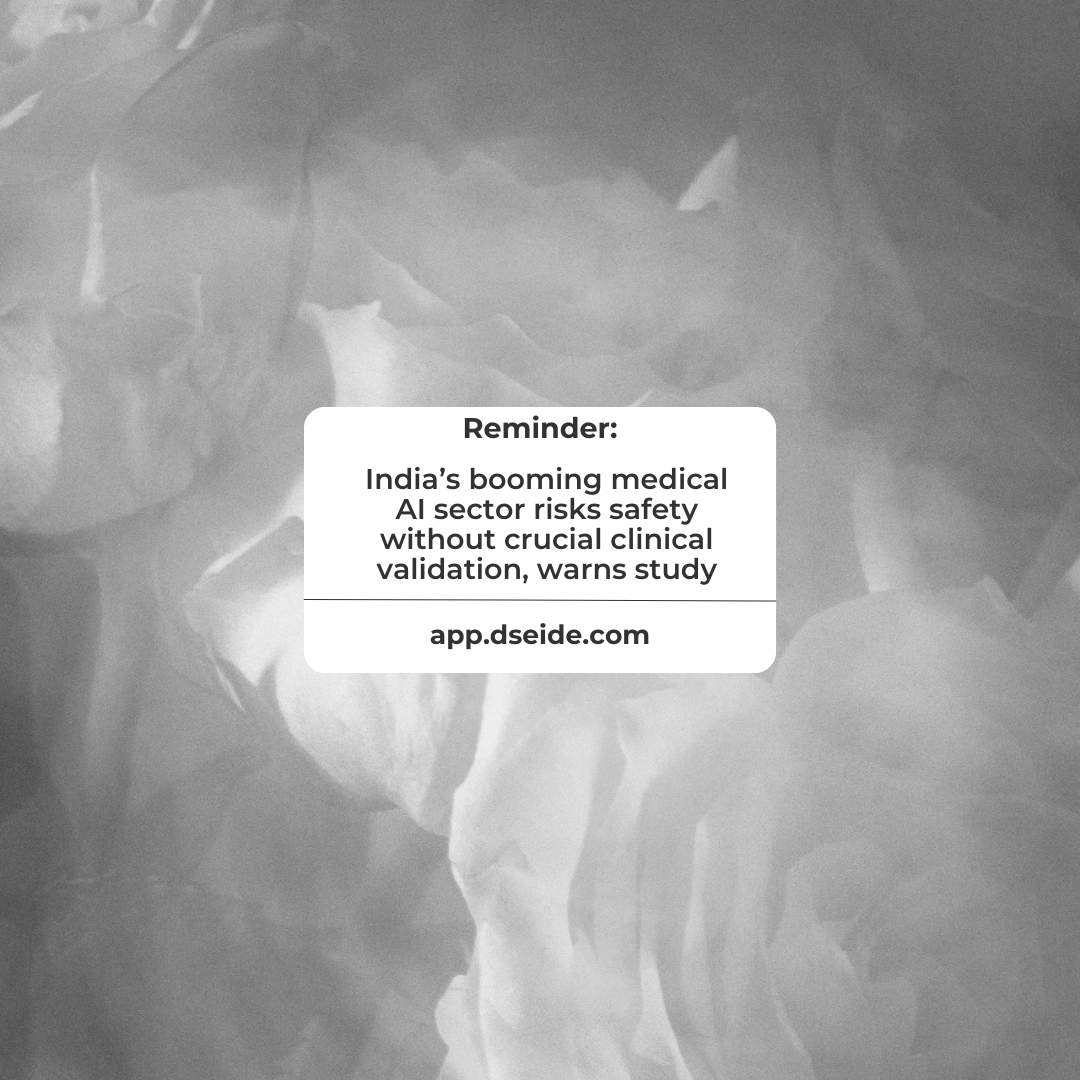Tech cities like Bengaluru are mushrooming with startups coming up with medical AI innovations but a new study finds that they are not being clinically validated and this is extremely risky.
Imagine this: a cutting-edge Artificial Intelligence (AI) system promises to diagnose your condition in seconds, guiding doctors to treatment options tailored to your unique needs. But what if this system hasn’t been tested adequately to ensure it works safely in real-world scenarios?
This isn’t a dystopian what-if. It’s the reality in India’s rapidly growing medical AI sector. While AI startups mushroom in tech hubs like Bengaluru, their innovations often lack rigorous clinical validation, raising concerns about their safety and effectiveness.
“AI can revolutionise healthcare, but we cannot let excitement overshadow the need for caution,” said Dr Denny John, Professor at the Faculty of Life and Allied Health Sciences at Ramaiah University of Applied Sciences whose recent paper the published in International Journal of Technology Assessment in Health Care, calls for a framework to clinically validate digital health technologies in India.
The study synthesises insights from 17 experts spanning diverse domains, including clinical practice, health technology assessment (HTA), and digital health innovation.
“The goal was to identify systemic prerequisites and design an actionable framework that aligns with India’s unique healthcare landscape,” Professor John noted.
Researchers from India, including Karnataka’s Ramaiah University of Applied Sciences, Amrita Institute of Medical Sciences and Research in Kochi, and other researchers from Kolkata and Kerala, have proposed a Digital Health Technology-Health Technology Assessment (DHT-HTA) framework.
The framework aims to streamline the evaluation of digital innovations in healthcare. The study presents a roadmap for implementing this framework in a country grappling with rapid advancements in health technology.
Source: South First
#healthcarestartup #startupfunding #dseide
Imagine this: a cutting-edge Artificial Intelligence (AI) system promises to diagnose your condition in seconds, guiding doctors to treatment options tailored to your unique needs. But what if this system hasn’t been tested adequately to ensure it works safely in real-world scenarios?
This isn’t a dystopian what-if. It’s the reality in India’s rapidly growing medical AI sector. While AI startups mushroom in tech hubs like Bengaluru, their innovations often lack rigorous clinical validation, raising concerns about their safety and effectiveness.
“AI can revolutionise healthcare, but we cannot let excitement overshadow the need for caution,” said Dr Denny John, Professor at the Faculty of Life and Allied Health Sciences at Ramaiah University of Applied Sciences whose recent paper the published in International Journal of Technology Assessment in Health Care, calls for a framework to clinically validate digital health technologies in India.
The study synthesises insights from 17 experts spanning diverse domains, including clinical practice, health technology assessment (HTA), and digital health innovation.
“The goal was to identify systemic prerequisites and design an actionable framework that aligns with India’s unique healthcare landscape,” Professor John noted.
Researchers from India, including Karnataka’s Ramaiah University of Applied Sciences, Amrita Institute of Medical Sciences and Research in Kochi, and other researchers from Kolkata and Kerala, have proposed a Digital Health Technology-Health Technology Assessment (DHT-HTA) framework.
The framework aims to streamline the evaluation of digital innovations in healthcare. The study presents a roadmap for implementing this framework in a country grappling with rapid advancements in health technology.
Source: South First
#healthcarestartup #startupfunding #dseide
Tech cities like Bengaluru are mushrooming with startups coming up with medical AI innovations but a new study finds that they are not being clinically validated and this is extremely risky.
Imagine this: a cutting-edge Artificial Intelligence (AI) system promises to diagnose your condition in seconds, guiding doctors to treatment options tailored to your unique needs. But what if this system hasn’t been tested adequately to ensure it works safely in real-world scenarios?
This isn’t a dystopian what-if. It’s the reality in India’s rapidly growing medical AI sector. While AI startups mushroom in tech hubs like Bengaluru, their innovations often lack rigorous clinical validation, raising concerns about their safety and effectiveness.
“AI can revolutionise healthcare, but we cannot let excitement overshadow the need for caution,” said Dr Denny John, Professor at the Faculty of Life and Allied Health Sciences at Ramaiah University of Applied Sciences whose recent paper the published in International Journal of Technology Assessment in Health Care, calls for a framework to clinically validate digital health technologies in India.
The study synthesises insights from 17 experts spanning diverse domains, including clinical practice, health technology assessment (HTA), and digital health innovation.
“The goal was to identify systemic prerequisites and design an actionable framework that aligns with India’s unique healthcare landscape,” Professor John noted.
Researchers from India, including Karnataka’s Ramaiah University of Applied Sciences, Amrita Institute of Medical Sciences and Research in Kochi, and other researchers from Kolkata and Kerala, have proposed a Digital Health Technology-Health Technology Assessment (DHT-HTA) framework.
The framework aims to streamline the evaluation of digital innovations in healthcare. The study presents a roadmap for implementing this framework in a country grappling with rapid advancements in health technology.
Source: South First
#healthcarestartup #startupfunding #dseide







